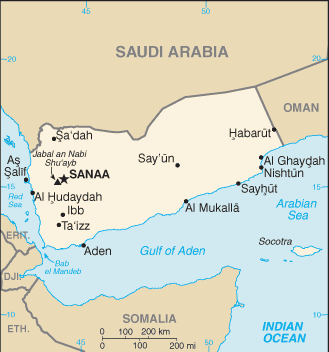From the Obama Administration’s perspective, the Houthi rebels who control the Yemeni capital of Sanaa are a big problem. Officials make no bones about it, condemning them as an extreme, anti-democratic proxy of Iran.
 Yet the primary problem from the US perspective is that the Houthis, long sequestered into the impoverished far-north of Yemen, are getting in the way of their understanding with a string of military dictators, most recent President Abd-Rabbu Mansour Hadi.
Yet the primary problem from the US perspective is that the Houthis, long sequestered into the impoverished far-north of Yemen, are getting in the way of their understanding with a string of military dictators, most recent President Abd-Rabbu Mansour Hadi.
Hadi was “elected” in a US-backed single-candidate ballot, which President Obama lauded as a model for the region. Hadi was pro-US coming in, and has given the administration free reign with its drone war, something the Houthis may not do.
The claims against the Houthis don’t hold up particularly well to scrutiny, either, with the “extreme rhetoric” paper thin, and the Houthis following an unusual brand of Shi’ite Islam that doesn’t put them on particularly friendly terms with the Iranian government.
Other than putting themselves in a position to push through reforms in a draft constitution, centering on long-time grievances the Houthis and others have had against the Saleh-Hadi regimes, the only real focus they’ve shown is in fighting against al-Qaeda in the Arabian Peninsula (AQAP), aiming to take back territory from them that the Yemeni military had long been unable to recover.
For the administration, the only question that needs answering is if the Houthis will look the other way during the drone war the way Hadi has. It’s likely they won’t, so the US will continue to demonize them.


